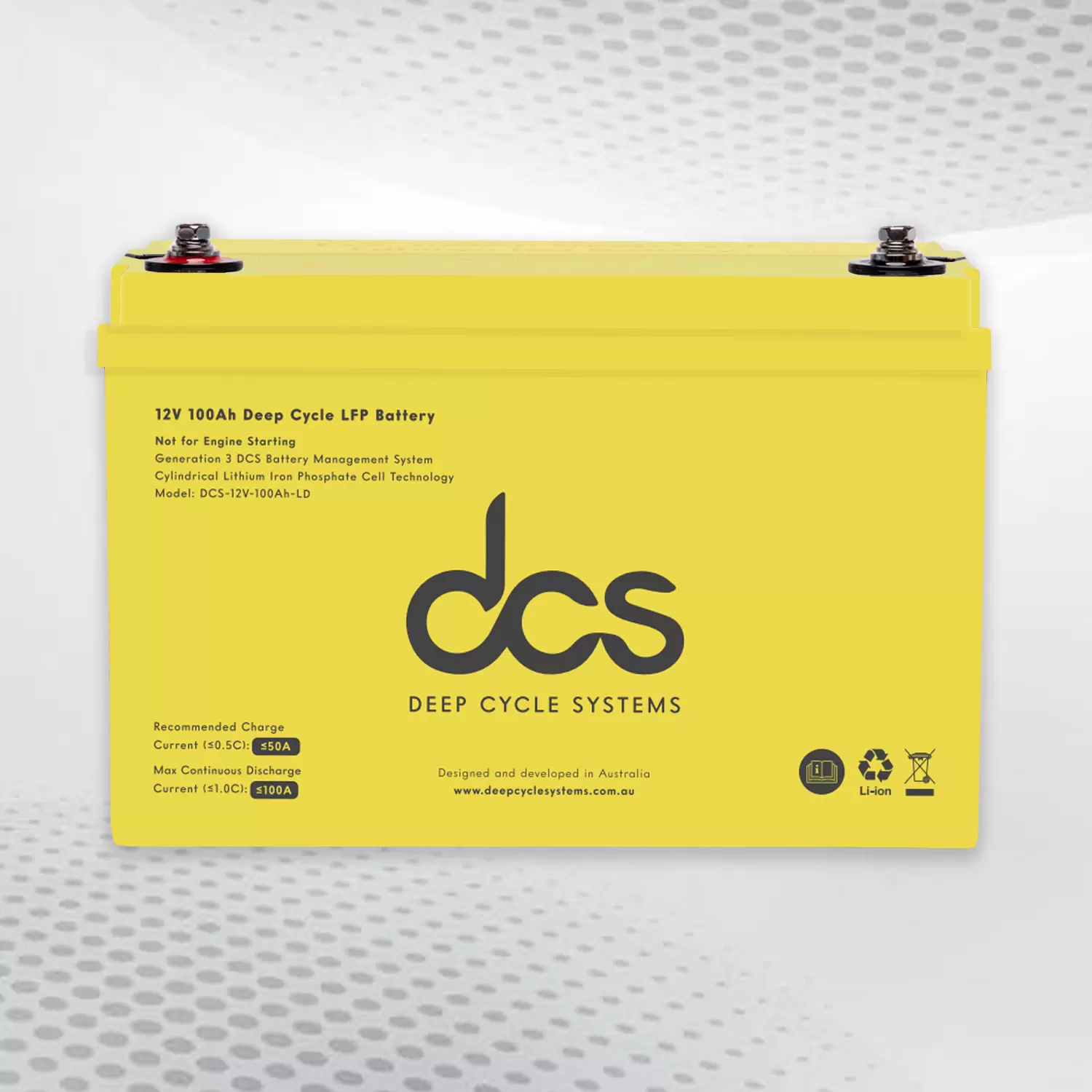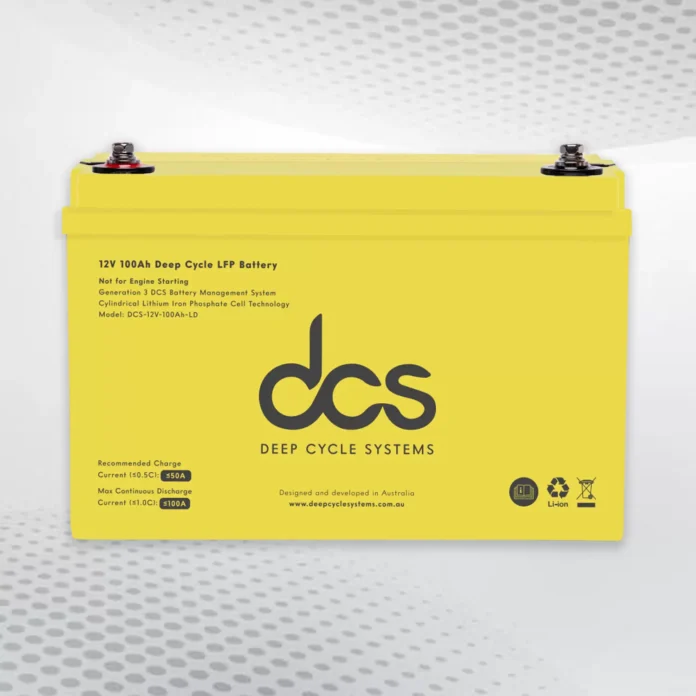When choosing the right battery for your energy storage needs, investing in a high-quality 12V 100Ah lithium battery can offer numerous benefits. From improved performance to environmental considerations, there are many reasons why opting for a lithium battery over traditional lead-acid options is a smart choice. This blog post will explore the various aspects of 12V 100Ah lithium batteries and why they are a worthwhile investment for residential and commercial applications.
Understanding the Basics of 12V 100Ah Lithium Batteries
12V 100Ah lithium batteries embody a rechargeable storage solution harnessing lithium-ion technology for energy storage and release. These batteries find extensive application across diverse domains, including but not limited to solar power storage systems, marine environments, and recreational vehicles’ power frameworks.
The 12V notation denotes the electrical potential of the battery, signifying its operational voltage level, whilst the 100Ah figure illustrates the battery’s capacity to store energy, indicating how much power it can deliver over an hour before necessitating a recharge. This fusion of compact design and high-capacity energy storage underscores their adaptability and suitability for a broad spectrum of applications where efficient, reliable power storage is paramount.
Environmental Impact of Lithium Batteries
Lithium batteries, when compared to traditional lead-acid counterparts, present distinct environmental advantages that contribute positively towards sustainability efforts. They exhibit an extended lifespan, significantly reducing the frequency of replacements and, as a result, curtailing the volume of waste disposed of in landfills. This attribute alone is crucial in diminishing the ecological footprint associated with battery usage.
Furthermore, lithium batteries demonstrate superior energy efficiency, a characteristic that reduces energy consumption. By utilising energy more efficiently, these batteries contribute to a decrease in greenhouse gas emissions, thus supporting global efforts to combat climate change. The environmental benefits offered by lithium batteries underscore their importance in fostering a more sustainable and eco-friendly approach to energy storage and utilisation.
Comparing Performance: Lithium vs. Lead-Acid
Lithium batteries exhibit a marked advantage over their lead-acid counterparts regarding performance metrics. Due to their lighter weight and compact nature, lithium options facilitate greater energy storage within a smaller footprint, thus offering enhanced power output for a given space. This high energy density is crucial in applications where space efficiency is paramount.
Moreover, lithium batteries boast a significantly longer cycle life, enduring more charge and discharge cycles before deterioration sets in, unlike lead-acid batteries, which often require more frequent replacements. This attribute contributes to the longevity of lithium batteries and supports a more consistent and reliable power supply over time.
The Economic Advantages of Choosing Lithium
Opting for lithium batteries, despite their higher initial expenditure, becomes financially advantageous in the long run. The extended service life of lithium batteries means fewer replacements are needed over time, translating into considerable cost savings. Furthermore, the efficiency with which these batteries operate leads to reduced energy consumption.
This efficiency results in lower electricity costs and may qualify users for incentives related to renewable energy adoption. In addition, the maintenance requirements for lithium batteries are minimal compared to lead-acid batteries, further reducing ongoing costs. Collectively, these factors invest in lithium batteries economically beneficial, ensuring a return on investment through reduced operational and maintenance expenses.
Applications And Uses of Lithium ion 12v 100ah
The versatility of Lithium ion 12v 100ah enables deployment across many settings, making them an invaluable resource for various energy storage requirements. These batteries are particularly beneficial in off-grid solar power systems, where they store energy generated by solar panels during the day for use at night or during periods of low sunlight.
In electric vehicles (evs), these batteries’ compact size and high energy density offer an optimal balance between weight and performance, significantly enhancing the vehicle’s range and efficiency. Backup power systems rely on these batteries to provide a continuous power supply during outages, ensuring critical systems remain operational.
Similarly, recreational vehicles (rvs) benefit from the extended cycle life and maintenance ease of these batteries, ensuring a dependable power source for lighting, appliances, and entertainment systems while on the move. The broad applicability of 12V 100Ah lithium batteries underscores their essential role in supporting contemporary energy needs across various sectors.
Safety Features of Lithium Ion Batteries
Lithium-ion batteries, particularly the 12V 100Ah variant, incorporate several safety features designed to mitigate risks and ensure secure operation across various applications.
Built-In Battery Management System (BMS
The cornerstone of lithium battery safety is the Battery Management System. This integrated circuitry monitors and controls the battery’s operational parameters, including voltage, current, and temperature, preventing unsafe conditions.
Overcharge Protection
To circumvent the dangers associated with overcharging, these batteries are equipped with mechanisms that automatically halt the charging process once the optimum voltage threshold is reached, safeguarding the battery’s integrity and longevity.
Temperature Control
Excessive heat poses a significant risk to battery safety. Advanced temperature control features ensure the battery operates within a safe temperature range, reducing the risk of overheating and potential thermal runaway.
Short Circuit Protection
In the event of a short circuit, immediate action is taken to interrupt the battery’s electrical circuit, preventing potential damage to the battery and surrounding devices.
Over-Discharge Prevention
Over-discharge prevention mechanisms protect the battery from being depleted beyond a critical level, ensuring the battery maintains a minimum charge level, thus preserving its health and performance.
These safety features collectively contribute to the reliability and security of using 12V 100Ah lithium batteries in various applications, reflecting the technology’s commitment to user safety.
Longevity and Durability of Lithium Batteries
12V 100Ah lithium batteries are distinguished by their remarkable longevity and robustness. These batteries are crafted using advanced technologies and high-quality materials, enabling them to endure frequent charge and discharge cycles without significant degradation.
The inherent durability of these batteries is a testament to their construction, which is designed to resist various environmental conditions whilst maintaining optimal performance. A key feature contributing to their extended lifespan is the ability to maintain a stable performance over many years, even under extensive use.
Proper care and adherence to maintenance guidelines can further enhance their longevity, making them a reliable power source for various applications. This enduring reliability and durability are significant factors that underscore the appeal of 12V 100Ah lithium batteries for those seeking a dependable energy storage solution.
Maintenance Tips for Your Lithium ion battery 12v 100ah
Adherence to recommended maintenance practices is crucial to maximise the performance and extend the lifespan of a Lithium ion battery 12v 100ah. Regularly monitoring the state of charge to avoid overcharging and deep discharging is imperative. Ensuring the battery remains clean and free from residue contributes to optimal functioning.
The battery’s storage environment should be considered; a cool, dry location is preferred to mitigate any detrimental effects temperature extremes may have on battery efficiency. Importantly, compliance with the manufacturer’s instructions for charging and storage preserves the battery’s integrity and safeguards against potential hazards. Following these guidelines assists in maintaining the battery’s health, guaranteeing its reliability for various applications.
Charging your 12v 100 ah Lithium Battery
Ensuring a 12V 100 Ah lithium battery is charged correctly maximises its efficiency and extends its operational lifespan. It is imperative to utilise a charger that aligns with the specifications intended for lithium-ion batteries to avoid potential damage. Chargers not specifically designed for this type of battery may inadvertently compromise the battery’s integrity and performance.
Adherence to the manufacturer’s guidelines regarding the appropriate charging voltage, current, and duration is crucial. This adherence not only ensures the safety of the battery during the charging process but also optimises its capability and longevity. Proper charging practices contribute significantly to maintaining the battery’s health, reinforcing its reliability and effectiveness in various applications.
Additionally, they ensure efficient energy transfer to the battery, mitigating wastage and fostering environmentally friendly power source usage. This careful handling will save you unnecessary expenses, simultaneously promoting sustainability in your energy consumption practices.
Future of Lithium Battery Technology
The horizon of lithium battery technology is marked by continual innovation and development, promising even greater efficiency and utility in the coming years. Advancements in battery chemistry are poised to increase energy densities, enabling batteries to store more power in the same physical space. This evolution is critical for applications requiring compact energy solutions, such as electric vehicles and portable electronics.
Concurrently, strides in manufacturing techniques aim to reduce the cost of lithium batteries, making them more accessible for a wider range of applications and users. Another exciting development is the potential for faster charging times, a significant improvement that could revolutionise how and where lithium batteries are used, particularly in the automotive industry.
Additionally, research is focused on extending the lifespan of lithium batteries, thereby enhancing their environmental friendliness and cost-effectiveness over time. These advancements indicate a vibrant future for lithium battery technology, with its impact expected to span across various sectors, driving the transition towards more sustainable energy storage solutions.
How to Choose the Right 12 V 100Ah Lithium Battery
Selecting the appropriate 12 V 100Ah lithium battery requires carefully considering several critical factors. Initially, one must evaluate the battery’s voltage and capacity to ensure compatibility with the intended application. The cycle life of the battery, indicating how many charge and discharge cycles it can withstand before its performance declines, is another crucial parameter to assess.
This aspect directly influences the longevity and cost-effectiveness of the battery over time. Equally important are the safety features integrated into the battery, such as overcharge protection and temperature control, which safeguard against potential hazards and enhance the battery’s reliability.
Opting for batteries from reputable brands and manufacturers with a solid track record of quality and performance is advisable, as these are more likely to offer the durability and reliability required for demanding applications.
FAQs
Are Lithium Batteries Safe For Use?
Yes, lithium batteries typically pose no safety hazards when used and maintained by recommended practices. Adhering to established safety protocols is paramount to mitigate accident risks.
What Is The Expected Lifespan Of 12V 100Ah Lithium Batteries?
With diligent care and adherence to maintenance guidelines, these batteries have been reliably available across various applications for years.
Is Using a Conventional Charger for a Lithium ion 12v 100ah Permissible?
Using a charger specifically engineered for Lithium ion 12v 100ah is crucial. This ensures the battery’s performance is optimized and prevents potential damage.
In What Ways Do Lithium Batteries Surpass Lead-Acid Batteries?
They offer notable advantages, including enhanced performance, extended operational lifespan, and superior energy efficiency.
How Can One Ascertain When A Lithium Battery Requires Replacement?
Observing the battery’s operational performance and capacity is key. A noticeable decline in either parameter may indicate the need for replacement.
Conclusion
Securing a premium 12 V 100Ah lithium battery emerges as a prudent decision, fostering enhanced performance, environmental stewardship, and financial efficiency. This investment proves invaluable across various applications, from ensuring the seamless operation of off-grid solar systems to providing dependable backup power in recreational vehicles. Embracing appropriate maintenance regimes and selecting a battery tailored to specific requirements extend the utility and lifespan of this energy solution. In essence, a lithium battery represents a versatile and sustainable option for those pursuing reliable power storage, promising enduring benefits for years ahead.
| Other Good Articles to Read |
| Blogs-Nation |
| Blogs-Peoples |
| Bryan Smith Blogs |
| intellect blogs |
| the fault in our blogs |
| blogs eu |
| oz forums |
| recruitment blogs |
| zet blogs |
| id blogs |
| Blog Studio legale |
| blogs map |
| Related Business Listings |
| Contact Directory |
| Local Business Profiles |


